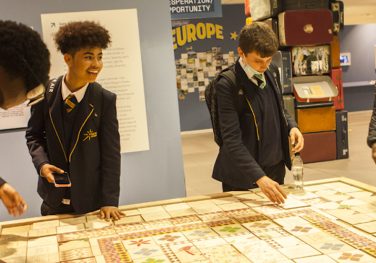Royal Museums Greenwich
Making sure young learners get back on track after Covid-19
School closures, lockdowns and Covid-19 restrictions disrupted pupils everywhere. But learners with special educational needs and disabilities (SEND) were disproportionately affected. Both younger learners and those aged 16 to 25 – who already face barriers to employment – need extra support to get back on track. We partnered with Royal Museums Greenwich to help.
Our grant of £14,730 funded five educational films and supporting resources for museum visitors with additional needs, including multiple and complex physical, medical, sensory and learning needs. Many of the actors who starred in the films were students with special educational needs from London schools.
- Young disabled people age 16 to 24 are 19% less likely to be in employment than their non-disabled peers. Royal Museums Greenwich’s careers resources aim to help close this gap.
- 7 students took part in making the educational films. They’ve been shared directly with pupils and their families at College Park School and QEII School, reaching around 180 pupils in these two schools alone.
- The films sit on the Royal Museums Greenwich website generating a reach and impact that will result in thousands of beneficiaries.

Developing literacy and life skills
The museum has two main aspects to their SEND programme which the films were part of. One promotes learning through sensory experience; the other builds employability skills. All the resources were created in collaboration with a working group of teachers and inclusive education specialists.
‘Sensory Stories’ resources focus on developing literacy skills and reading for pleasure. They include writing, poetry, illustration and communication skills and ideas for multi-sensory classroom activities to support teachers. The employability films and resources aim to contribute to closing the disability employment gap. They re-create real-life scenarios for SEND learners to role-play, helping young people prepare for living more independently and for the workplace. They also help rebuild communication skills after lockdown, and reinforce bridges between formal learning and employment.
“I work in a college with students aged 18 to 25 with multiple learning disabilities. Our students need practical and motivational activities to learn. Sometimes it’s difficult for them to understand concepts or to focus on an activity. I have found that the sessions created by the museum are very engaging and all our students love going there to take part.”
More Success Stories

Horniman Public Museum and Public Park Trust

Imperial War Museums

